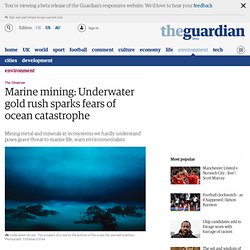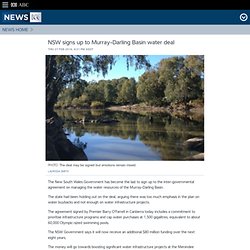

EU blacklist to stop spread of alien species. 16 April 2014Last updated at 11:47 ET By Claire Marshall BBC environment correspondent The BBC's Claire Marshall goes in search of the killer shrimp, a species which is threatening British fish stocks The European Parliament has approved new legislation to stem the spread of invasive species such as "killer" shrimp or Japanese knotweed.

There will be a ban on the possession, transport, selling or growing of species deemed as of "Union Concern". The list was going to be restricted to 50, but will now have no limit. It is not clear which species will be banned. A deal between EU member states effectively means the bill will become law within a few months. It came on the day that British MPs slammed current government policy on controlling alien species as "not fit for purpose". Biodiversity loss Continue reading the main story “Start Quote Efforts are very often not effective simply because those species do not respect geographical boundaries” End QuotePavel PocMEP Garden plants Voracious predators. World court ruling reaffirms protection of Southern Ocean whales. Gland, Switzerland – The International Court of Justice ruled today that Japan should immediately cease all whaling activities under its current scientific programme JARPA II.

Japan will abide by court's whaling decision. A great day for whales thanks to Australia Japan has been ordered to immediately end the killing of whales in the Antarctic after a UN court backed Australia's claim that the slaughter was unlawful.

WARNING: Some people may find some of the images distressing. 1, 2014 Japan will respect an International Court of Justice order to end its annual Antarctic whale hunt despite "deep disappointment" with the landmark decision, it said on Monday. The Court decided in favour of Australia, ruling that Japan's whale hunt in the Southern Ocean was not scientific and it should cease the program "with immediate effect". Marine mining: Underwater gold rush sparks fears of ocean catastrophe. This is the last frontier: the ocean floor, 4,000 metres beneath the waters of the central Pacific, where mining companies are now exploring for the rich deposits of ores needed to keep industry humming and smartphones switched on.

The prospect of a race to the bottom of the ocean – a 21st-century high seas version of the Klondike gold rush – has alarmed scientists. The oceans, which make up 45% of the world's surface, are already degraded by overfishing, industrial waste, plastic debris and climate change, which is altering their chemistry. Now comes a new extractive industry – and scientists say governments are not prepared. "It's like a land grab," said Sylvia Earle, an oceanographer and explorer-in-residence for National Geographic. "It's a handful of individuals who are giving away or letting disproportionate special interests have access to large parts of the planet that just happen to be under water. " But the warnings may arrive too late. Ecosystem Services. Mongolia's water scarcity could threaten its economic boom. The Gobi desert.

The Mongolian mining boom may promise great things for economy but chronic water stress is a cause for concern. Photograph: Alamy The sight of foreign faces in Ulan Bator used to turn heads. Now they are two-a-penny as the once remote Mongolian capital fast becomes a hotspot for international investors. The main draw is the country's rich mineral deposits, which, if successfully exploited, could see the national economy more than double over the next two decades.
Impinging on that rosy picture, however, is the tricky question of water availability. "In the coming two decades, water demand is expected to triple even as water suppliers are shrinking", states 2030 WRG, which predicts a 244,000 m3 per day water deficit by the end of the next decade. A range of potential infrastructure options is on the table. For the moment, the onus is on mining companies making their operations as water efficient as possible. Sharing the Land: Restoring Degraded Ecosystems and Improving Livelihoods Through Agroforestry. US-Water-Report-2013. NSW signs up to Murray-Darling Basin water deal. The New South Wales Government has become the last to sign up to the inter-governmental agreement on managing the water resources of the Murray-Darling Basin.

The state had been holding out on the deal, arguing there was too much emphasis in the plan on water buybacks and not enough on water infrastructure projects. The agreement signed by Premier Barry O'Farrell in Canberra today includes a commitment to prioritise infrastructure programs and cap water purchases at 1,500 gigalitres, equivalent to about 60,000 Olympic-sized swimming pools. The NSW Government says it will now receive an additional $80 million funding over the next eight years. The money will go towards boosting significant water infrastructure projects at the Menindee Lakes and in the Nimmie Caira area of the lower Murrumbidgee Valley.
There is also $32 million to support regional communities to adjust to the changes required by the plan. "We had some really big sticking points. "It's been a long time coming.